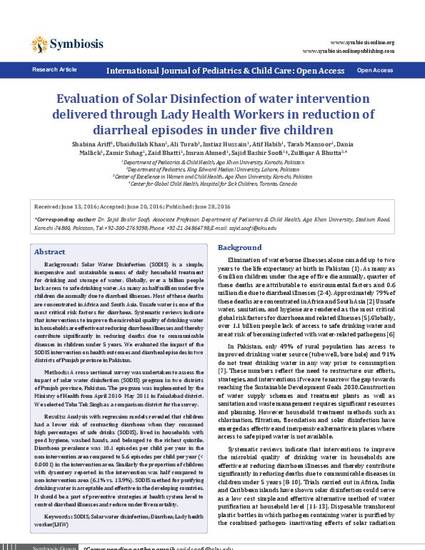
Background: Solar Water Disinfection (SODIS) is a simple, inexpensive and sustainable means of daily household treatment for drinking and storage of water. Globally, over a billion people lack access to safe drinking water. As many as half million under five children die annually due to diarrheal illnesses. Most of these deaths are concentrated in Africa and South Asia. Unsafe water is one of the most critical risk factors for diarrhoea. Systematic reviews indicate that interventions to improve the microbial quality of drinking water in households are effective at reducing diarrhoea illnesses and thereby contribute significantly in reducing deaths due to communicable diseases in children under 5 years. We evaluated the impact of the SODIS intervention on health outcomes and diarrheal episodes in two districts of Punjab province in Pakistan.
Methods: A cross-sectional survey was undertaken to assess the impact of solar water disinfection (SODIS) program in two districts of Punjab province, Pakistan. The program was implemented by the Ministry of Health from April 2010- May 2011 in Faisalabad district. We selected Toba Tek Singh as a comparison district for the survey.
Results: Analysis with regression models revealed that children had a lower risk of contracting diarrhoea when they consumed high percentages of safe drinks (SODIS), lived in households with good hygiene, washed hands, and belonged to the richest quintile. Diarrhoea prevalence was 10.1 episodes per child per year in the non-intervention area compared to 5.6 episodes per child per year (< 0.0001) in the intervention area. Similarly the proportion of children with dysentery reported in the intervention was half compared to non-intervention area (6.1% vs. 13.9%). SODIS method for purifying drinking water is acceptable and effective in the developing countries. It should be a part of preventive strategies at health system level to control diarrheal illnesses and reduce under five mortality
Available at: http://works.bepress.com/atif_habib/13/
